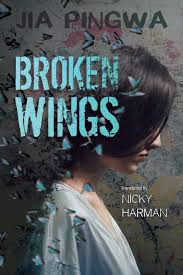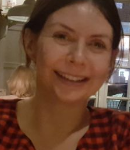Broken Wings, by Jia Pingwa
translated by Nicky Harman
ACA Publishing Ltd, 2019

Publisher's blurb
Despite her humble rural beginnings, Butterfly regards herself as a sophisticated young woman. So, when offered a lucrative job in the city, she jumps at the chance. But instead of being given work, she is trafficked and sold to Bright Black, a desperate man from a poor mountain village.
Trapped in Bright’s cave home, Butterfly struggles to repel his lustful advances, and she plans her escape… not so easily done in this isolated and remote village where she is watched day and night.
Will her tenacity and free spirit survive, or will she be broken?
Reading Chinese Network Reviews
Reviewed by Kevin McGeary, 5/10/21
 In recent years, the publishing industry in Anglophone countries has asked a lot of questions of its own responsibilities to society. Penguin Random House UK has made high-profile announcements on its diversity and inclusion. At its best, this can boost representation of marginalised groups, and – as has been one of publishing’s great contributions to the world - give a voice to the voiceless. An increasing number of writers hire ‘sensitivity readers’, to make sure their portrayals of members of groups they don’t belong to ring true.
In recent years, the publishing industry in Anglophone countries has asked a lot of questions of its own responsibilities to society. Penguin Random House UK has made high-profile announcements on its diversity and inclusion. At its best, this can boost representation of marginalised groups, and – as has been one of publishing’s great contributions to the world - give a voice to the voiceless. An increasing number of writers hire ‘sensitivity readers’, to make sure their portrayals of members of groups they don’t belong to ring true.
Another important contribution publishing has made to the world is to break taboos. At the centre of Jia Pingwa’s Broken Wings is the taboo subject of rape.
Narrator Butterfly is an aspirational country girl who is kidnapped while working in the city. She is transported to the impoverished countryside of Shaanxi Province and sold as a bride to Bright Black. Bright imprisons her in a cave, and his multiple rapes eventually lead to her bearing his child.
In an afterword, Jia explains that he decided to tackle this issue in fiction when the daughter of a neighbour was kidnapped and trafficked. In the current climate, a man writing from the viewpoint of a trafficking and rape victim sounds problematic, but the most important question is, does he make it work?
Famously, one of the most acclaimed novels of the twentieth century Lolita is narrated by a child molester. "Little Louise Roque" by the French short story writer Guy de Maupassant, is about a rich, powerful man who murders a schoolgirl. When it comes to taboo subjects, many writers have had success by following a principle similar to the one laid out by comedian George Carlin: “find out where the line is drawn and cross it deliberately.”
Unfortunately Butterfly seldom feels real as a female protagonist. Even her self-reflections are full of the male gaze. At one point she observes “They were still talking away on the strip, about how I must be a virgin because my nipples were so small and my arse cheeks were so firm”.
Much of the second chapter is dedicated to giving her abuser a tragic backstory. It is no surprise that female reviewers have shown unease with all of this.
While the novel fails as a portrait of a victim, it does have value in illustrating something very real and contemporary. That is the phenomenon of human trafficking, which has been exacerbated by China’s gender imbalance.
Near the beginning, a range of local superstitions are listed, giving the reader an idea of just how bigoted the society is. These superstitions include ‘you weren’t supposed to pee in the road or else your child would be born without a bum hole’ and ‘if you went out at night, you had to keep spitting because that was the only thing that could keep demons away’.
On a micro level, the novel fails to give Butterfly an authentic voice, but it does a service in providing a big picture about an issue that needs to be talked about more.
Reviewed by Kevin McGeary
Reviewed by Amy Matthewson, 23/6/19
 Broken Wings is a novel about a trafficked woman named Butterfly, who was kidnapped from a city in China and sold as a wife to a man in a poor and isolated village. She is imprisoned, raped, and has a baby. Jia Pingwa brings attention to an important and topical issue: the trafficking of women, both Chinese and foreign, in a country where the gender imbalance has resulted in millions of men unable to find wives. While Jia makes clear in the Afterword that he finds the “kidnapping of women and children ...brutal and cruel,” (225) I am left bewildered at his decision to portray the villagers with much sympathy and question his motivations for writing this novel.
Broken Wings is a novel about a trafficked woman named Butterfly, who was kidnapped from a city in China and sold as a wife to a man in a poor and isolated village. She is imprisoned, raped, and has a baby. Jia Pingwa brings attention to an important and topical issue: the trafficking of women, both Chinese and foreign, in a country where the gender imbalance has resulted in millions of men unable to find wives. While Jia makes clear in the Afterword that he finds the “kidnapping of women and children ...brutal and cruel,” (225) I am left bewildered at his decision to portray the villagers with much sympathy and question his motivations for writing this novel.
For starters, Jia ticks all the boxes on how a male author should not write female characters. Broken Wings is narrated through the voice of Butterfly, the female protagonist, but this only leaves readers with the impression that Jia has yet to meet and converse with a real woman. Jia uses the tired clichés of defining Butterfly according to her appearance and constantly refers to her youth and beauty. Jia’s description of Butterfly’s sexual desire for her rapist reads like a male fantasy novel that eroticises and normalises misogynistic sexual violence.
More unsettling is the Afterword where Jia explains his aversion to violence in writing. He states, “It seems to be the fashion to write violent, extreme narratives. Maybe that is what today’s readers want, but it does not suit me” (226). He then continues by likening his style of writing to a work of art by commenting that he “always thought that [his] writing was somehow akin to ink-wash paintings” and that the essence of this style of painting is in its “suggestion rather than the detail” (226-227).
Jia’s explanation that his writing avoids extreme violence contradicts how and what he writes in Broken Wings. The rape of Butterfly is especially ghastly and instead of using the power of suggestion (like an ink-wash painting), Jia decides to devote four pages to describe every horrific detail. His thoughts are therefore disturbing: does he not consider detailing the rape of a woman a form of ‘violent, extreme narrative’?
Jia remains entirely detached from his protagonist and instead, he places his efforts in having his readers connect with the village men. In the Afterword, Jia quotes a village man, “My family will die out because of me, and our village will vanish in our lifetime” (225). Does maintaining the family blood line justify the devaluation and commodification of women’s lives and the ability to abuse women with impunity? Once again, I am left wondering what purpose this book is meant to serve.
In deciding to tackle the issue of human trafficking, I would have appreciated a more sensitive approach. Trafficking is a process of enslavement and underscore deeper systemic issues resulting from the one child policy and China’s preference for male babies. Not only did Jia choose not to engage with these underlying issues, he appears to try and excuse the behaviour of perpetrators by claiming that their circumstances give them no choice but to brutally enslave women.
On a different note, I must commend Nicky Harman for her translation. Translating such a disturbing story of violence cannot have been an easy undertaking and she has done wonderfully in translating this Chinese literature for English readers.
Reviewed by Amy Matthewson
Reviewed by Catherine Shipley, 21/6/19
 The words that first come to mind when I think of Broken Wings are: Brutal, Harrowing, Disturbing. The novel, however, is much more complex than that. It is multi-layered, weaving individual stories together with a reflection of modern China, including issues caused by rapid economic development and government policies, as well as cultural values. Jia Pingwa writes with sensitivity whilst, nonetheless, not shying away from confronting the reader with bleak realities.
The words that first come to mind when I think of Broken Wings are: Brutal, Harrowing, Disturbing. The novel, however, is much more complex than that. It is multi-layered, weaving individual stories together with a reflection of modern China, including issues caused by rapid economic development and government policies, as well as cultural values. Jia Pingwa writes with sensitivity whilst, nonetheless, not shying away from confronting the reader with bleak realities.
The story is about a young woman from the countryside, Butterfly, who moves to the city to live with her mother, who works as a rubbish picker. Eager to support her mum, Butterfly pursues a work opportunity, which turns out to be a cover for a kidnapping operation. She ends up in a completely unfamiliar part of China, in a remote village of cave-dwellers. It transpires that she has been bought by a peasant in the village, to be his wife. The story is based on a true incident and, in fact, such kidnapping cases and countryside villages full of impoverished, single men, are not uncommon in modern China.
The topic of this story and reports of real-life cases will undoubtedly trigger spontaneous comments from those unaffected by such dangers. People may question why the victim didn’t escape, surely there must have been opportunities? Did they not resist? How did they fall for the kidnappers’ plot in the first place? They may think about how they would deal with such a situation, drawing an easy conclusion. After reading Jia Pingwa’s work, there will be no such questions in their minds, perhaps just a feeling of shame.
Reading, Broken Wings, I empathised with characters that I would usually have dismissed as being unworthy of sympathy. Without warning, my moral compass seemed to have been compromised. My blind confidence of knowing basic rights and wrongs was shown to be embarrassingly naïve. Battling to make sense of it all, I felt quite confused and emotional.
Through this powerful story we learn, not only about the horrors of women being kidnapped and sold as wives but also about the grinding poverty that people face in certain parts of China. Most of the story takes part in the village of cave dwellers, where we see people surviving on very limited amounts of food and water. It is not just the quantity, but also the lack of variety, that is striking. Inhabitants of the region (in north-west China) make the best of their potatoes and buckwheat by devising a wide range of recipes, the most time-consuming of which are saved for special guests. The monotony and challenges of life in the remote village is shown through such scenes. It is in sharp contrast to the city life (and even the village life) that Butterfly came from. Butterfly’s high heels, the only item she possesses and which she sometimes wears between the dusty caves, are a reminder of the ridiculous contrast between these two worlds, both of which are part of the same country.
Although there is much to despair about in Broken Wings, it is the humanity of the characters that brings some relief. It is fascinating to observe how such a variety of personalities, from wise, philosophical Great-Grandad, to thieving Monkey and eccentric Aunt Spotty-Face, can muddle along together in the same small village. Almost like a family, thrown together by chance, they are cruel to each other, have a laugh together, share intimacies and partake in one-upmanship. As with a family they seem to need each other and support each other.
Out of perceived necessity, the villagers and, more specifically, Bright (the buyer of Butterfly) subject Butterfly to unimaginable violence and emotional pain. Their ultimate desire, however, is to welcome Butterfly to the family and give her the love and support that each family member receives, hoping also that she will allow the family to continue by bearing a son.
The frustration of such contradictions is a feeling that is triggered by the narrative of Broken Wings and is also a reflection of life in China today.
Reviewed by Catherine Shipley
